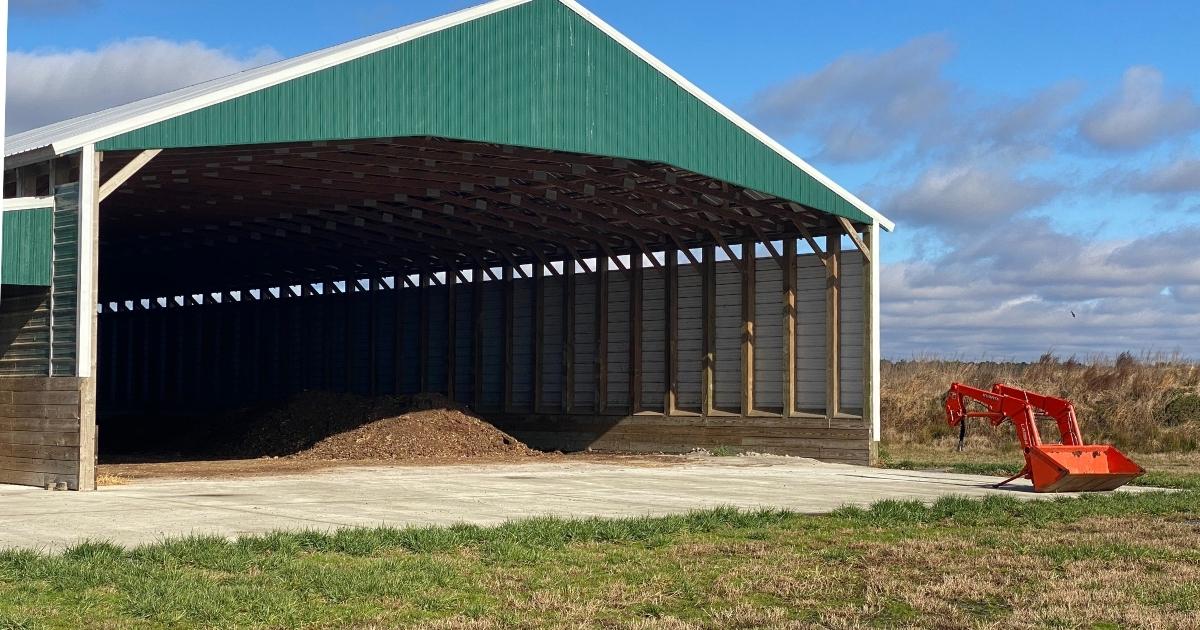
Category: Cooperative Extension

Practical Advice for Manure Management On Small Farms
September 08, 2022 Written by Sydney Young Riggi, Susan Truehart Garey and Dr. Amy Shober | Photo by Georgie Cartanza
Nutrient Management in Delaware
Delaware’s Nutrient Management Law has been in effect since 1999 and requires anyone who applies manure or fertilizer to 10 or more acres or has eight or more animal units (an animal unit is equal to 1,000 lbs. of live animal weight) to obtain a Delaware Nutrient Management certification. If a farm meets the eight animal unit threshold but has less than 10 acres of fertilized land, it must also have an Animal Waste Management Plan. If a farm operation comprises more than 10 acres of fertilized land, a Nutrient Management Plan is required to be compliant with the Nutrient Management Law regardless of the number of animal units. Farms/operations that meet the animal or land area criteria and have questions regarding the Delaware Nutrient Management Program should contact their local Cooperative Extension Office. This article will provide some practical tips on manure handling to retain nutrient value while minimizing environmental impacts for farms that do not meet the criteria to be captured in the Delaware Nutrient Management Law.
Manure is a valuable resource, but it can be tricky to manage properly. Farmers are experiencing record high fertilizer prices, which makes manure more valuable as it contains many plant-required nutrients. If you treat the manure on your operation as a valuable resource, it will retain its nutrient content and will have greater value to the end user. In addition, proper manure management also helps protect the environment.
Small farms have unique manure handling challenges as compared to larger farms. Small farms may not have enough land area to apply the manure that has been generated or may lack the needed equipment to apply manure. In addition, small farms may be concerned about animal health and neighbor relations related to applying manure on pasture or cropland.
Manure Storage
Manure contains nutrients that are essential for plant growth. Proper manure storage helps retain plant-essential nutrients in the manure for future use after land application. The goal of manure storage is to keep the manure dry. Nutrients are less likely to leach from dry manure, and dry manure will be less appealing to flies. The best method to keep manure dry is to keep it in a designated storage area. Building a manure storage area does not have to be an expensive endeavor. Some options include:
Jersey barriers or pressure-treated lumber in a “U” shape with a tarp or roof over it
A concrete, compressed clay or stone dust pad with a tarp or roof over it
A dumpster with a lid or cover for pickup by a manure hauling service
If manure is stockpiled on the ground, it should be covered to keep it as dry as possible. The stockpile should be surrounded by a good stand of grass that will act as a filter strip. Manure stockpiles should adhere to these setbacks:
100 feet from any body of water or drainage ditch
100 feet from any public road
200 feet from any residence not located on your property
200 feet from any domestic well
300 feet from a public water supply
Stockpiling manure outside uncovered is only recommended for poultry litter. When stockpiled correctly, poultry litter forms an exterior crust that sheds water. Other types of manure and bedding do not form a crust and will act like a sponge to absorb water. As such, it is recommended to cover manure. Covering manure keeps the manure dry, which makes it easier to handle, conserves plant nutrients and reduces insect pest populations.
Spreading Manure
Ideally, manure is land applied to meet the fertility requirements of the plants being grown. Before spreading manure on any field or pasture, it is recommended that both manure and soil samples are taken for analysis. Once those analysis results are received, a custom fertilizer recommendation based on the soil sample results can be made. The fertilizer recommendation will provide guidance on how much manure and/or commercial fertilizer will be needed to meet the fertility needs of the crop. Soil samples can be analyzed by the University of Delaware Soil Testing Laboratory or a private laboratory. Manure and compost samples can be analyzed at the Delaware Department of Agriculture or a private laboratory.
Questions to ask prior to spreading manure include:
Does the crop being planted or growing need an application of manure?
Has the manure spreader been calibrated recently?
What will the weather conditions be prior, during and after spreading?
Are there water bodies (including ditches), wells and roads that should be avoided?
Are there neighboring properties that should be avoided?
In Delaware, under the Nutrient Management Law, manure and fertilizer cannot be land applied between Dec. 7 and Feb. 15 because plants are not actively growing and cannot take up nutrients. If nutrients are applied during this time, they are more likely to runoff and enter a water body.
Flies and Odor
Manure attracts flies and gives off odors. Good management can minimize both of these annoyances.
Fly populations can be minimized by:
Keeping manure dry
Removing manure from the farm or land applying before the fly breeding season begins
Cleaning up muddy areas, feed spills, or old decaying hay where flies can breed
Turning manure or compost piles regularly
Considering a biological control (parasitic wasps) or chemical control
Odor from manure can be reduced by:
Keeping manure dry
Avoiding storing manure in wet, wooded or flood-prone areas
Locating manure storage area away from neighbors
Planting a windbreak around the manure storage area
Composting(not simply stockpiling) to reduce odor and volume
Having manure picked up frequently if it will not be land applied
Manure is a valuable resource, and treating it with care will also help to protect the environment. For more resources and/or information about manure management, please contact your local county Cooperative Extension Office.
